Iran-Backed Houthis Attack Saudi Oil Facility Causing A Fire
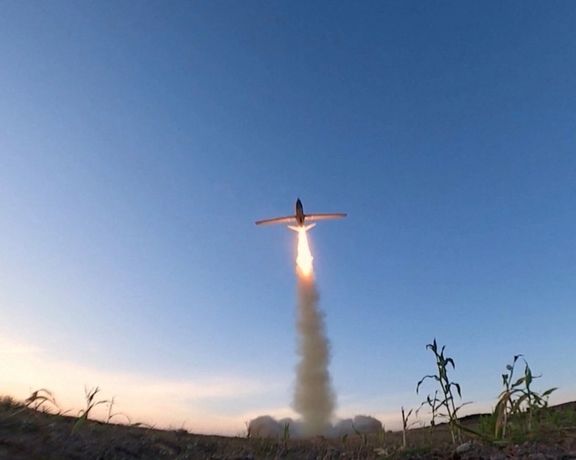
Yemen's Iran-backed Houthis launched attacks on Saudi energy facilities on Friday and the Saudi-led coalition said a facility of oil giant Aramco was hit.

Yemen's Iran-backed Houthis launched attacks on Saudi energy facilities on Friday and the Saudi-led coalition said a facility of oil giant Aramco was hit.
The attack caused a fire at a petroleum products distribution station in Jeddah where two tanks were set ablaze, but there were no casualties.
A huge plume of black smoke could be seen rising over the Red Sea city where the Saudi Arabian Grand Prix is taking place this weekend, an eyewitness said.
Unverified videos shared on social media showed fire raging in oil tanks in an Aramco facility on the outskirts of Jeddah.
There was no immediate comment from Aramco or the energy ministry when contacted by Reuters.
The Iran-aligned Houthis who have been battling a coalition led by Saudi Arabia for seven years launched missiles on Aramco's facilities in Jeddah and drones at Ras Tanura and Rabigh refineries, the group's military spokesman said. He said they also targeted "vital facilities" in the capital Riyadh.
Saudi state media had earlier reported that a string of drone and rocket attacks by the Houthis was foiled by the coalition.
Saudi air defenses also intercepted and destroyed a ballistic rocket launched towards the port city of Jazan, which caused a "limited" fire to break out at an electricity distribution plant, state media reported.
Reporting by Reuters
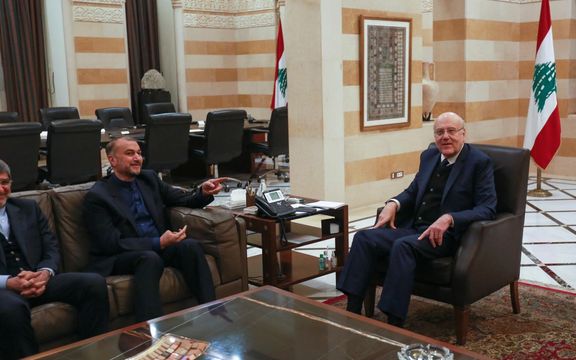
Hossein Amir-Abdollahian, Iran’s foreign minister, has said the whole Middle East would benefit from a renewed nuclear deal between Tehran and world powers.
But during a meeting with Lebanese Prime Minister Najib Mikati Thursday evening, Amir-Abdollahian said “we’ve not reached the final point on lifting sanctions yet.”
Opponents of reviving the 2015 nuclear deal and lifting US sanctions say that giving Iran tens of billions of dollars will enable it to finance its allies and militant proxies in the region.
The foreign minister continuing his trip on Friday, met political leaders from all Lebanese sects, including President Michel Aoun, a Maronite Christian, and the heads of the two main Shia parties, house speaker Nabih Berri of Amal, and Hassan Nasrallah, general secretary of Hezbollah.
In a news conference after meeting with his counterpart Abdallah Bou Habib, Amir-Abdollahian said Iran wanted “a good, strong and lasting agreement, but not at the cost of crossing its red lines.” The foreign minister said United States sanctions should be removed “in the maximum way.”
A recurrent theme of Amir-Abdollahian’s visit has been the need for detente with Saudi Arabia in line with President Ebrahim Raisi’s commitment to improved relations with Iran’s neighbors.
The Lebanese foreign minister welcomed détente between Iran and Saudi Arabia, according to a readout of the meeting provided by Iran’s Foreign Ministry. Saudi-Iran tensions have often played out in Lebanon, which has a substantial population of both Sunni and Shia Muslims. Riyadh in October broke off diplomatic relations with Beirut, and its influence has also diminished with the withdrawal from politics of Saad Hariri, leader of the Sunni Mustaqbal party and a Saudi citizen, in January.
Keeping Doors Open
Bou Habib, according to a readout from the Lebanese foreign ministry, said not only Lebanon would benefit from an improvement in Tehran-Riyadh relations, which would also “provide an opportunity to help advance intra-Yemeni dialogue and resolve the crisis in that country.”
In an interview with Al Mayadeen television Friday, Amir-Abdollahian reiterated that Iran was ready for a fifth round of talks with Saudi Arabis and was “working hard to keep the doors of dialogue open between the two countries.” Earlier this month Iran suspended bilateral contacts, facilitated by Iraq, after Saudi Arabia beheaded 81 men − including 41 Shia Saudi Shia, seven Yemenis and a Syrian − for “heinous crimes.”
In a meeting with cultural and political scholars and figures Friday, the Iranian foreign minister said Tehran was “ready to help Lebanon with medical services, medicine and medical equipment and other basic needs.” Amir-Abdollahian said Thursday Iran had offered to establish two 1,000-megawatt power stations in Lebanon to help with its chronic power crisis and connect its energy grid to Lebanon through Syria and Iraq.
Much of Lebanon has zero mains electricity, following decades of corruption and a financial crisis that erupted in late 2020, plunging 80 percent of the population into poverty. The crash followed the failure of post-war governments to control a spiraling debt financed by expatriate deposits in the Lebanese banking sector.
But the Iranian foreign minister’s offer of assistance comes as Tehran has often complained about shortage of medicine and medical supplies because of US sanctions. It also suffers from chronic electricity shortages partly because the capacity of its power stations is inadequate.
Iranian government-controlled media reporting on Amir-Abdollahian's meetings did not mention his offer of assistance, possibly because of popular resentment toward Islamic Republic's long-standing policy of providing financial and military resources to allies and proxies in the region.
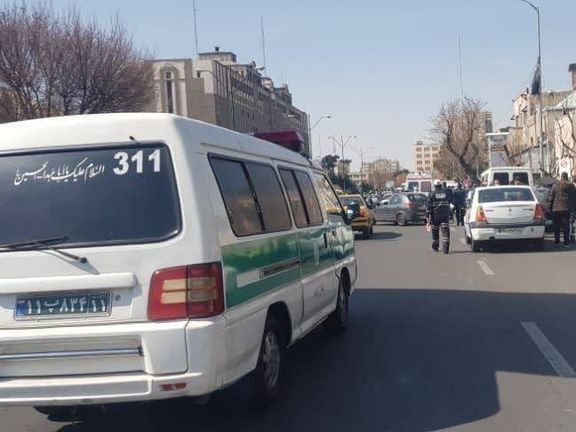
The deputy commander of Iran's police says the livelihood of their personnel is one of the main concerns of the Law Enforcement Force, amid high inflation.
Brigadier-General Qasem Rezaei told the ILNA news agency Friday that housing units and other facilities would be provided for officers to improve their living conditions. Rezaei also said that salaries paid to police were not in a par with the important services they provided.
Late in January, dozens of members of the armed forces and retirees protested in several Iranian cities over living and working conditions. Teachers, nurses, firefighters, prison guards, and employees of the judiciary have all held protest rallies or strikes to demand higher salaries.
Earlier in January, the spokesman for Iran's police said that while salaries for police officers had increased several times in the previous Iranian year (ending March 20, 2021), the government could not afford substantially higher salaries.
Akbar Shokat, head of the construction workers union, recently claimed prices had risen five to ten-fold since 2018, when the United States introduced ‘maximum pressure’ sanctions. The International Monetary Fund gives consumer price inflation of 34.6 percent in 2019, 36.4 percent in 2020, 39.3 percent in 2021 and projects 25.7 percent for 2022 – giving an overall increase to date of over 255 percent since 2018.
Iran Statistical Center and media, however, have reported higher inflation in 2021, especially for food items that increased more than 60 percent.
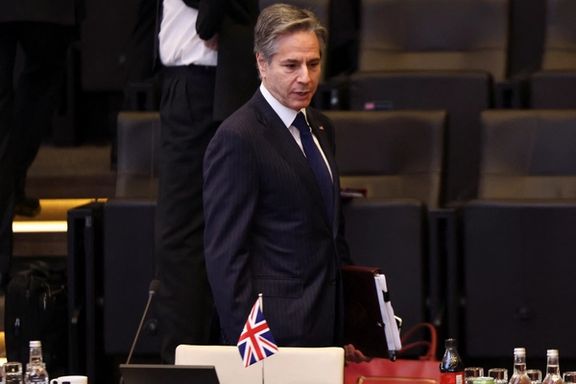
US Secretary of State Antony Blinken will travel to the Middle East and North Africa starting on Saturday in a trip that will be dominated by Russia's invasion of Ukraine and Iran.
Blinken is set to visit Israel, the West Bank, Morocco, and Algeria from Saturday to Wednesday, the State Department announced on Thursday, in a trip that will focus on Iran and the conflict in Ukraine.
"Both of those are going to be really at the top of the agenda," top US diplomat for Near Eastern affairs Yael Lempert told reporters.
Lempert said that Blinken will discuss Israel's role as mediator between Russia and Ukraine during his visit over the weekend.
"We appreciate Israel's role," Lempert said. Israeli Prime Minister Naftali Bennett has been trying to mediate an end to the Ukraine-Russia conflict.
She warned that the conflict will only continue to increase the price of basic staples in the Middle East and North Africa region as wheat prices rise.
Lempert said that while in Morocco, Blinken will also meet with Abu Dhabi Crown Prince Sheikh Mohammed bin Zayed Al Nahyan, during which the two will discuss a range of issues including Iran, Yemen, Syria, global energy markets and Ethiopia.
The Abraham accords, a U.S.-sponsored drive to improve relations between Israel and a range of Arab countries, will also be on the agenda, Lempert said.
"It's an opportune moment for this meeting. There's a lot to discuss," she said.
Report by Reuters
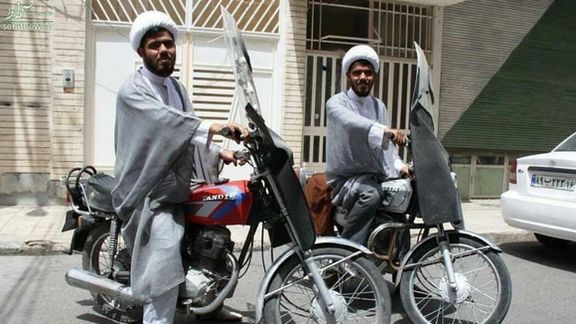
This article is the third in a series about Iran’s Shiite clerics, explaining how they study, get a clerical rank, get married and what they do for a living.
----------------------------------------------------------------------------------------------------------------------------
As Iranian cleric Seyyed Ahmad Batha'i has observed, "Generally speaking, there are two types of clerics in Iran: Those who are good speakers, and those who are not, regardless of the level of their knowledge."
A good cleric should have a good voice, be a good storyteller and be capable of grabbing and keeping the attention of audiences. They should also know a little about classical Persian music, dastgahs, so that they could sing the dramatic bits of religious stories. Some clerics do it very well. Some don't.
Former President Hassan Rouhani was definitely a bad singer according to his friends and foes. Every Muharram, he used to eulogize and sing during the cabinet meetings to pay tribute to the martyrs of Karbala including Imam Hussain. But as most Iranians have seen on state TV, his singing was awful. Grand Ayatollah Hossein-Ali Montazeri reminisced in his memoires that former President Akbar Hashemi Rafsanjani was not a good singer either and while his eulogy was meant to make the listeners cry, it made them laugh. "I had to beg him to stop singing," says Montazeri.
Any good cleric knows that singing and eulogizing are the peak points of the religious performance art. Although being a cleric is not totally about singing or speaking, these are essential tools of the trade. In Qom, many clerics prefer riding motorcycles rather than driving or walking. They usually sing while riding. A motorcycle travels fast and puts a distance between them and people who like to tease clerics. And the people in Qom are really good in the art of teasing.
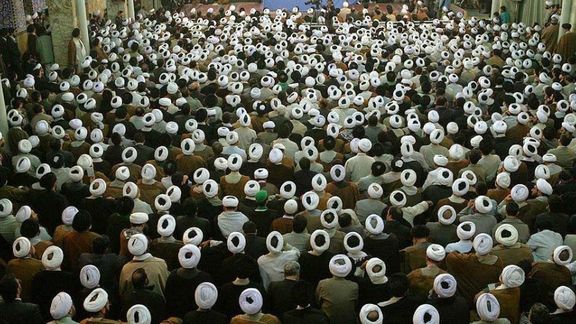
The traffic department in Qom in the 1980s exempted cleric motorcyclists from putting on a helmet, arguing that a turban was enough to protect the clerics' head in case of an accident.
Mehdi Parnian, a cleric born in 1975, who has studied at the Qom Seminary and later continued his academic studies for an MA degree in communication, is now the head of the seminary's "Humor Office." Parnian has collected the forms of address and titles of Iranian clerics in a brief lexicon.
Sheikh or Shaykh as the word is pronounced in Iran, was a title and form of address in the old times for respectable elderly clerics and tribal leaders. However, in modern Persian, shaykh is the lowest rank for a cleric. These are the ones who may have even not been to a seminary. Some people call them Ashaykh, meaning Mr. Shaykh.
Seyyed, which was previously used for clerics who were the descendants of the holy prophet, is currently being used equally for all the descendant of the prophet even if they are not clerics.
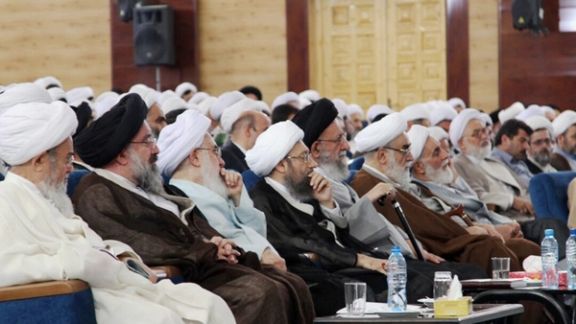
Mullah or molla, in the past meant a literate person. Later it was used for clerics. According to Parnian, nowadays, it is a word with a lot of negative connotations just one step short of a swear word. Among the traditional intellectuals, it means a well-educated person.
Akhund, literally means cleric and is the most popular Persian word that describes a cleric. In the old times, an Akhund was someone who ran a religious school or madrassah.
Seqat ul-Eslam literally means someone who is trusted by Islam. It was a highly respectful form of address in the past. In the modern world, the term has lost its true meaning. Any cleric may be called a seqat ul-Eslam regardless of his real rank.
Talabeh, is a student of divinity or religious knowledge. Although it is a plural world it is used for a single cleric, the new plural is Tollab. These are newly coined words. They did not exist in old Persian. They come from the same root as Taliban, or students of religion.
Hojjat ul-Eslam, means the reason and a guide for Islam. It was not a popular word in the past but when it was used, it was for prominent clerics, short of an Ayatollah. Nowadays, any cleric, even at the lowest level can use the title.
Hojjat ul-Eslam val Muslemin, is the same as Hojjat ul-Eslam and means a reason and a guide for Islam and Muslims.
Ayatollah, is the sign of God. The term became popular after the 13the century. These are high-ranking clerics who can make religious and Sharia interpretations by referring to the Koran or the stories about the holy prophet and the Imams.
Ayatollah ul-Uzma, is a big sign of God or a grand ayatollah. This is a new term that was used first in 1961 for Grand Ayatollah Boroujedri.
Allamah, or as it is pronounced in modern Persian Allameh, means a highly educated multi-disciplinary scholar. This title is used very rarely and is not part of the official titles used in the seminaries.
Despite all the labels and ranks, today's Iranian clerics are divided into two broad groups: A minority who are senior state or religious officials and the rest who make a living as clerics, or maybe have some regular job like a teacher or a low-ranking bureaucrat.
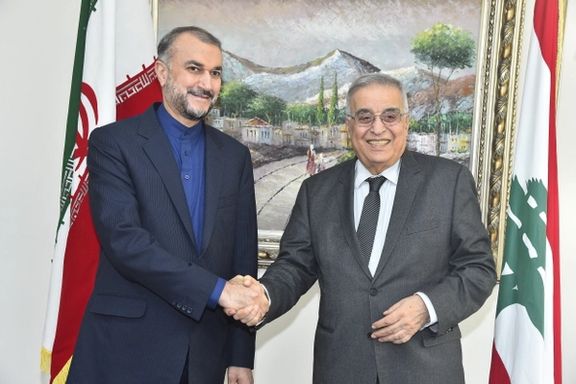
Iran’s foreign minister has traveled to Lebanon to discuss developments in the Middle East region and bolster relations with senior Lebanese authorities.
Hossein Amir-Abdollahian said that while “mixed messages” had been received from Riyadh, Iran expected “the Saudis will act in the interest of the region.” There has been recent speculation that Saudi Arabia may restore diplomatic relations with Lebanon, broken off in October.
Saudi-Iran tensions have often played out in Lebanon, which has a substantial population of both Sunni and Shia Muslims. Earlier this month Iran suspended bilateral talks after Saudi Arabia beheaded 81 men, including seven Yemenis and a Syrian, for “heinous crimes.” Forty-one were Saudi Shiites, Human Rights Watch reported, apparently sentenced over protests.
On arrival at the airport, Amir-Abdollahian told reporters he had met Lebanese Prime Minister Najib Mikati on the side-lines of the 58th Munich Security Conference a month ago, and expressed “Iran's readiness to establish two 1,000-megawatt power stations in Lebanon and to fully develop trade and economic cooperation...”
Lebanon suffers from chronic power shortage, one consequence of a financial crisis that erupted in late 2020, plunging 80 percent of the population into poverty, following the failure of post-war governments to control a spiraling debt financed by Lebanese banks.
Amir-Abdollahian is due to meet President Michel Aoun, Parliament Speaker Nabih Berri, Prime Minister Najib Mikati, and Foreign Minister Abdallah Bou Habib. The foreign minister called consultations with Lebanon, where officials hail from a range of sects, “regular and constructive.”